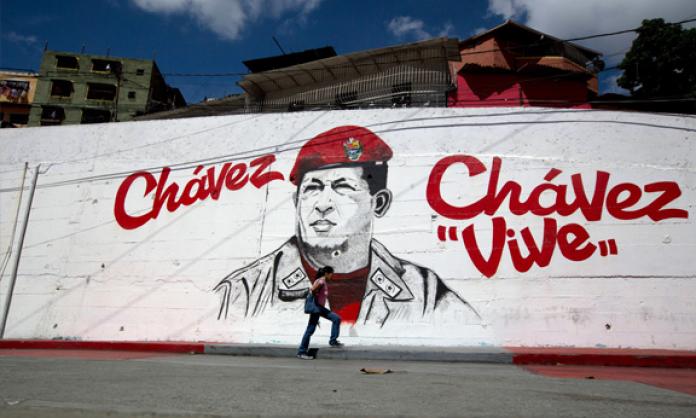A good case can be made for Latin America being both the birthplace of neoliberalism and where the first shots were fired against it. Chile became the laboratory for neoliberal thought on the back of the crushing defeat of the working class in September 1973. A decade and a half later, the Venezuelan working class put neoliberalism on notice. Like the 1948 Bogotazo in Colombia, the Caracazo ushered in a wave of working class struggle that, after more than 8,000 major protests, led to the election of Hugo Chavez in 1998.
The street democracy of the newly organised workers found political representation in the Movimiento V [Quinta] República (MVR), established in 1997 as an electoral outlet for the Movimiento Bolivariano Revolucionario 200, whose central leader, Chavez, originated from the profoundly democratic aspirations of a generation of junior officers drawn from the poor masses.
Chavez’s government was radicalised from below and forced to make choices from above. It was progressively isolated by the international capitalist class and the especially parasitical Venezuelan bourgeoisie and its social democratic allies, Acción Democrática and the Confederación de Trabajadores de Venezuela. Nationalist and democratic aspirations, rooted in the plebeian masses, increasingly came into conflict with the social and political forces of Venezuelan capitalism. The election of the Constituent Assembly and adoption of the new Bolivarian Constitution in 1999 set the government on a collision course, further politicising Chavez, many of his MVR supporters and the proletarian elements in the military. In November 2001, Chavez’s government introduced 49 “revolutionary” laws that struck at the heart of Venezuelan capital: in particular, the distribution and ownership of land and other natural resources and control of oil production and rents.
A period of revolutionary possibility opened up, but it did so in conditions characterised by a working class still raw in political experience and saturated in the politics of clientelism. This was not Chile in 1970, where, despite the weight of Stalinism, tens of thousands of workers were organised in class conscious political organisations and where the struggle created a vanguard layer of the working class contesting for ideological and political leadership.
While commentators such as Marta Harnecker have hailed the “the growth of the revolutionary subject” in Venezuela, it is precisely the stunted growth of this subject that has been the key characteristic and limitation of the revolutionary struggle.
The militant class organisation and action of the working class have been decisive at key points – most notably in defeating the 2002 coup and capitalist lockout – but have not managed to build a “political instrument” rooted in its class interest.
An important accumulation of class struggle experience occurred between April 2002 and 2006, which Chavez himself sought to consolidate by disbanding the thoroughly corrupt and discredited MVR and regrouping the more radical elements in forming the Partido Socialista Unido de Venezuela (PSUV). The new party and its massive membership may have sidelined some of the old bureaucratic swamp of the MVR, but it incorporated new parasitic elements, fanned the culture of clientelism and did nothing to cohere those in the vanguard. Eight months after the founding of the PSUV, the Chavez government lost the referendum for further constitutional change.
A period of stalemate ensued. On the one hand, the working class and poor in Venezuela continued to grow in class consciousness, bolstered by the impact of the social, economic and democratic reforms of the Chavez government and radicalised also by the actions of a capitalist class acutely aware of the stakes. There was an extraordinary, rich experience of social and political organisation at the base: Venezuelan workers begun to take on aspects and elements of state-type control and administration in health, education, telecommunications, urban land management and numerous centres of production, distribution and public services, involving millions. The solidarity, confidence and combativeness of workers grew massively.
On the other hand, this process often remained reliant on the patronage of the government and hostage – directly and indirectly – to a capitalist state bureaucracy. The political consciousness and organisational capacity of the advanced sections of the working class were not enough to meet the challenges of regular new government initiatives and the influx of raw and newly organised workers into the revolutionary process.
While defeats in 2002-03 set back the capitalist class, the Chavez government was encouraged to continue extending the Bolivarian hand into the old state and rolling out the agenda of “21st century socialism” through government initiative.
Pursuing a political strategy anchored on electoral contests and dependent on the political power afforded it by its capacity to redistribute oil rents, the Bolivarian revolution was subjected to a constant and heavy bureaucratic pull. For every old bureaucrat quashed, there emerged a new one; for every old corruption, a new type.
By and large, the historic authority of Chavez and his loyalty to the more radical aspects of the Bolivarian process, favoured the vanguard elements. But with Chavez’s death, coinciding with the collapse of oil prices and a general downturn in the continental struggle against neoliberalism, the Venezuelan bourgeoisie seized on its best chance to date.
The context provided the Venezuelan capitalist class the opportunity to wage an especially vicious economic war and to use a new wave of terror to break the resolve of the less conscious working class forces and those middle class sectors that had backed the government.










